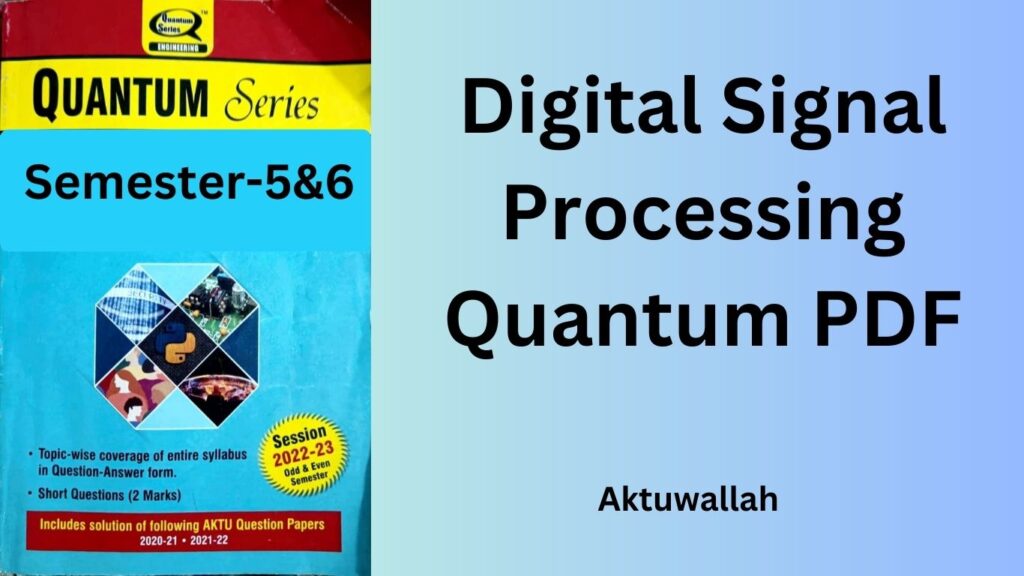Download Digital Signal Processing Quantum Pdf For Aktu B-tech 3rd Year:
Digital Signal Processing (DSP) is a fundamental subject in the field of Electronics and Communication Engineering (ECE). As a student pursuing a B-Tech degree at AKTU (Dr. A.P.J. Abdul Kalam Technical University) in the 3rd year of ECE, it is essential to have access to relevant study materials that can aid in your learning process. In this article, we will explore the importance of digital signal processing and provide insights into key topics that you should focus on. Additionally, we will guide you on how to download Digital Signal Processing Quantum Pdf that will serve as a valuable resource for your studies.
How to download Digital Signal Processing Quantum Pdf for free?
Just click at the given link.
GET PDF
Download other quantum pdf for Aktu B-tech 3rd year: Click Here
Download Aktu Syllabus of B-tech 3rd year: Click Here
Download Handwritten Notes of all subjects: Click Here
Download DSP PYQs: Click Here
Visit AKTU official site to explore more…..
Key topics covered in Digital Signal Processing Quantum Pdf:
Table of Contents
- Introduction to Digital Signal Processing Quantum Pdf
- Basics of Signals and Systems
- Analog and Digital Signals
- Discrete-Time Signals and Systems
- Sampling and Reconstruction
- Discrete Fourier Transform (DFT)
- Fast Fourier Transform (FFT)
- Z-Transform
- Filter Design and Analysis
- Finite Impulse Response (FIR) Filters
- Infinite Impulse Response (IIR) Filters
- Multirate Signal Processing
- Applications of Digital Signal Processing
- Real-Time Digital Signal Processing
Introduction to Digital Signal Processing Quantum Pdf
Digital Signal Processing involves the manipulation and analysis of signals using digital techniques. It plays a crucial role in various applications such as audio and video processing, communications, medical imaging, and more. DSP techniques enable us to process signals efficiently, extract relevant information, and enhance the quality of the signals.
Basics of Signals and Systems
To understand Digital Signal Processing, it is important to grasp the fundamentals of signals and systems. Signals can be categorized as analog or digital, and they carry information in the form of variations in amplitude, frequency, or phase. Systems, on the other hand, process these signals and produce an output based on specific operations.
Analog and Digital Signals
Analog signals are continuous-time signals that represent real-world phenomena. Digital signals, on the contrary, are discrete-time signals that are obtained by sampling and quantizing analog signals. The conversion from analog to digital signals allows for efficient processing and manipulation of the signal using digital techniques.
Discrete-Time Signals and Systems
Discrete-time signals are sequences of values defined at discrete intervals of time. Digital Signal Processing deals with these discrete-time signals and their corresponding systems. Various mathematical representations and operations, such as convolution and difference equations, are used to analyze and process these signals.
Sampling and Reconstruction
Sampling is the process of converting continuous-time signals into discrete-time signals by capturing samples at regular intervals. Reconstruction refers to the process of converting discrete-time signals back into continuous-time signals. These concepts are crucial in digital signal processing and have implications on signal fidelity and aliasing.
Discrete Fourier Transform (DFT)
The Discrete Fourier Transform is a fundamental tool in DSP that allows us to analyze the frequency content of discrete-time signals. It decomposes a signal into its constituent frequency components, providing insights into the spectral characteristics of the signal. The Fast Fourier Transform (FFT) is an efficient algorithm for computing the DFT.
Z-Transform
The Z-Transform is a mathematical tool used to analyze discrete-time systems. It provides a convenient way to represent signals and systems in the complex frequency domain. The Z-Transform enables us to analyze the stability, causality, and frequency response of discrete-time systems.
Filter Design and Analysis
Filter design is a crucial aspect of digital signal processing, as it allows us to manipulate the frequency content of signals. Various filter types, such as low-pass, high-pass, band-pass, and band-stop filters, are employed to achieve desired signal characteristics. The design and analysis of filters involve techniques like windowing, frequency sampling, and pole-zero placement.
Finite Impulse Response (FIR) Filters
Finite Impulse Response (FIR) filters are widely used in digital signal processing. They have a finite duration impulse response, which makes them stable and easy to design. FIR filters find applications in audio processing, image filtering, and system identification.
Infinite Impulse Response (IIR) Filters
Infinite Impulse Response (IIR) filters have an infinite-duration impulse response and utilize feedback in their structure. They offer efficient implementation and can achieve sharper frequency response characteristics compared to FIR filters. IIR filters are commonly used in applications such as equalization, noise cancellation, and audio compression.
Multirate Signal Processing
Multirate signal processing techniques involve the manipulation of signals at different sampling rates. It allows for efficient processing of signals and reduces computational complexity. Upsampling, downsampling, and polyphase decomposition are some of the techniques used in multirate signal processing.
Applications of Digital Signal Processing
Digital Signal Processing finds extensive applications in various domains. It is utilized in audio and video compression, speech and image recognition, radar and sonar systems, biomedical signal processing, and many other fields. Understanding the applications of DSP can help you appreciate its significance and potential career opportunities.
Real-Time Digital Signal Processing
Real-time DSP involves the processing of signals in real-time or near-real-time scenarios. It requires efficient algorithms and hardware implementations to meet strict timing constraints. Real-time DSP is prevalent in applications such as audio and video streaming, telecommunications, and control systems.
Conclusion
Digital Signal Processing plays a pivotal role in the field of Electronics and Communication Engineering. By acquiring knowledge and skills in DSP, you can unlock a wide range of opportunities in various industries. Understanding the key topics covered in this article, such as signals and systems, Fourier analysis, filter design, and real-time processing, will provide a solid foundation for your DSP journey.
1 thought on “Download Digital Signal Processing Quantum PDF”